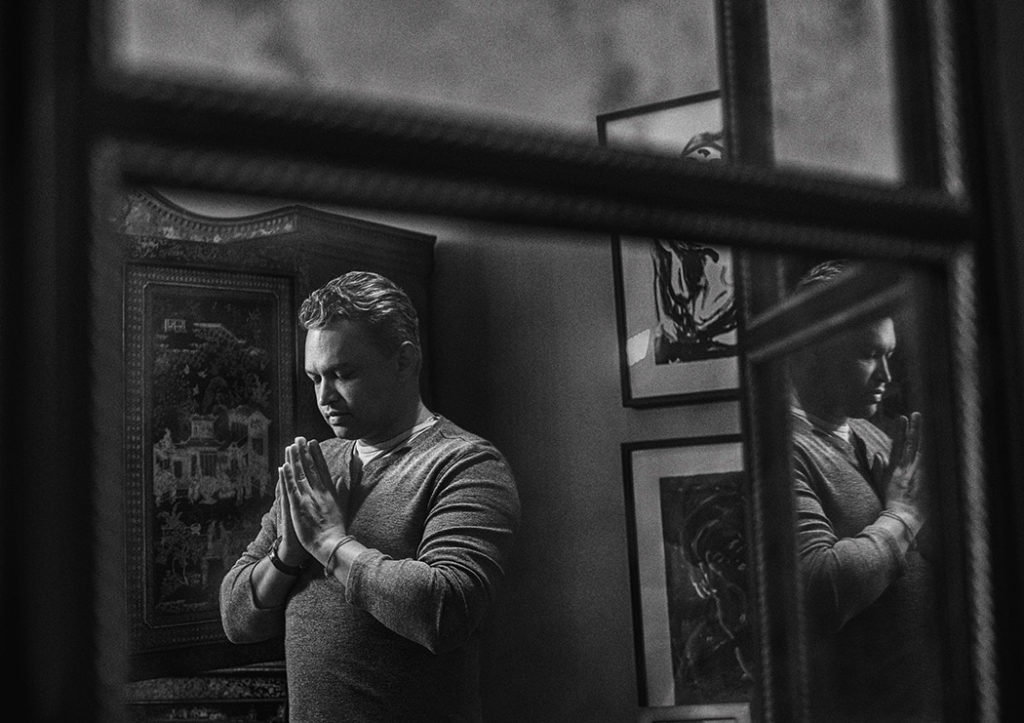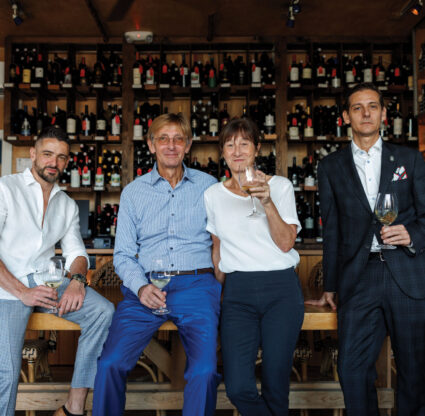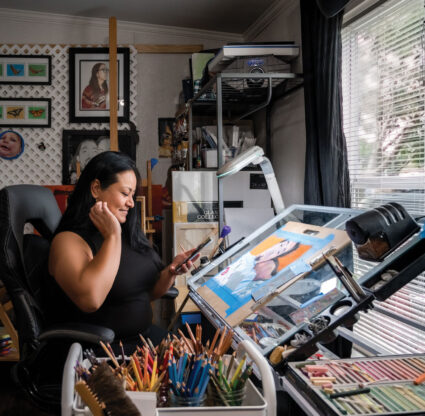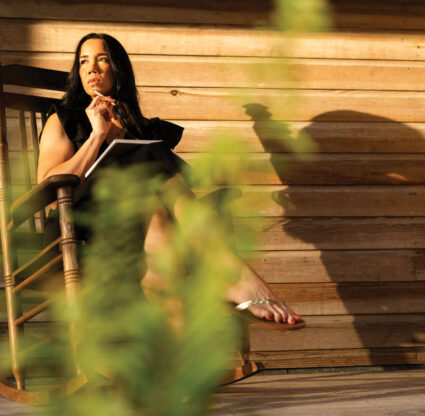Jan and Panache Desai are arguing over Avengers: Endgame.
Namely, how much Jan should reveal about the comic-book blockbuster, which the couple had gone to see the night before, the premiere. Her husband shushes her, repeatedly, lest she slip me a spoiler. She giggles.
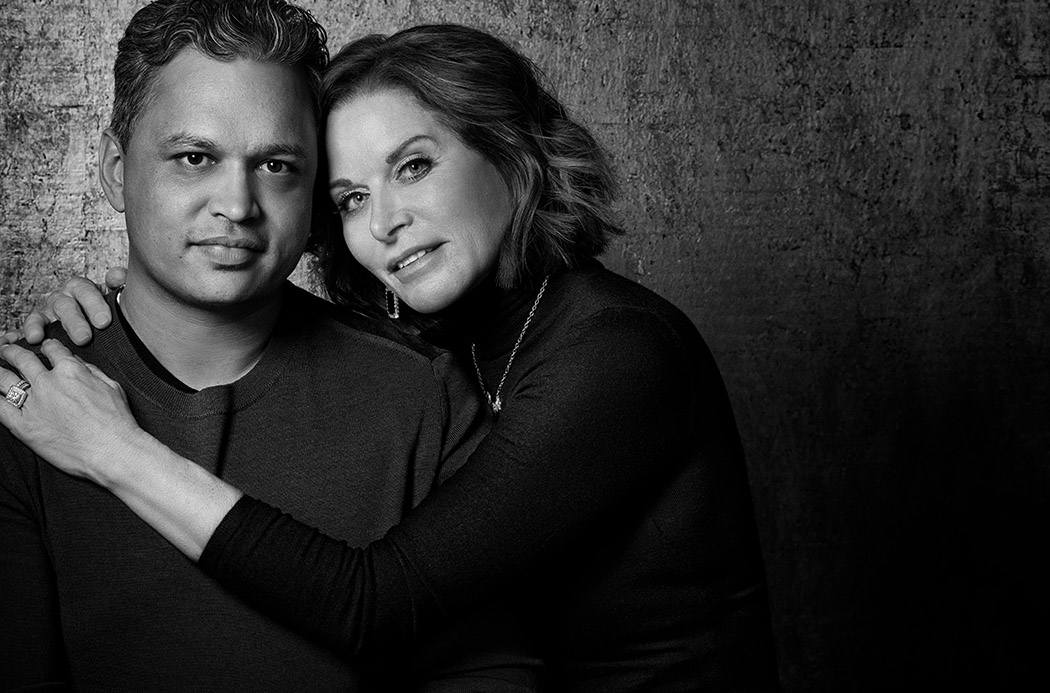
They settle into a chandeliered library in their Port Royal home. Classical music—Pachelbel’s canon, Bach sonatas—pipes through unseen speakers. The couple on this Friday night are in their “Saturday morning best,” shorts and T-shirt and bare feet for him; tank top and blouse and bare legs for her. Panache keeps half an ear open for the pizza delivery guy. Elsewhere in the house are four young children, remarkably quiet.
If you’re picking up on a polarity, your interpretation is correct. This marriage is one of extremes—Jan, a Minnesota-born Catholic and one-time denizen of Naples high society, and Panache, a British-born Indian and rising star in the world of personal development, spirituality and self-actualization. He is 40. She is 61. They are not shy about that.

Together, from this house, they run a business based on Panache’s teaching that is reaching audiences around the world. He’s been on Oprah. He’s appeared with Tony Robbins, been endorsed by Deepak Chopra, teaches at the Omega Institute and Kripalu, two of the nation’s best-known centers for spirituality and holistic health. His second book, You Are Enough: Revealing the Soul to Discover Your Power, Potential, and Possibility, will be released in late February.
As you hear the story of how they met and the rise of Panache’s speaking, writing and mentoring career, you’ll need to suspend your belief. Parts of their tale are surreal. The Desais aren’t shy about that, either, though they know it’s off-putting to some. The transformation each went through—on his and her own and through their marriage—forms a foundation to Panache’s teachings. That’s why we’ll start with the love story before we talk about the philosophy Panache Desai is working to share from his Naples home to a growing, global audience.
The relationship was born out of a knot in Jan’s stomach.
She was 50, newly divorced, rudderless. She’d arrived in Naples a decade earlier, a tour de force who wowed the city’s elite with her fundraising prowess and found herself invited to serve on numerous major nonprofit boards. She had a financier husband, a young son, a stepdaughter, the “perfect” everything because that’s how she insisted her life be.
The 20-year marriage unraveled. She unraveled.
A girlfriend swooped in, seeing Jan’s distress and hoping to connect her with those who might help. “There’s this Indian guy in town called Panache, and you should come see him.” Jan resisted. She didn’t want to go. She didn’t sit still, didn’t meditate, didn’t like—no, couldn’t stand—silence. She was supposed to take her son on an out-of-town trip, a last hurrah before the reality of single motherhood set in. An inner voice implored, “Don’t get on that plane.” Nausea set in.
The friend—and the voice—prevailed. On a Monday night, Jan found herself in a private home in North Naples with about a hundred other people, mostly women, looking for guidance and support in their lives. In spite of her reluctance, Jan had been searching, too. After the divorce, she’d committed herself to a period of introspection. She sought counseling to figure out her tendency to “undermine” relationships. Therapy felt safe and mainstream. This gathering did not.
“He’s sitting up there in this big chair and he’s kind of folded into himself, and at 7 o’clock, he unfolds and I take my glasses…,” she puts on a pair in demonstration, “… and I punch my friend’s arm and say, ‘Look at him. He’s just a baby. What can he possibly know?’”
From the front of the room, Panache scanned the crowd and zeroed in on Jan. “It was impossible not to notice her,” he says, wryly. She sat in the back of the room, scowling behind thick-rimmed glasses. “She was doing the very opposite of what everyone else was doing,” Panache chuckles. He’d asked participants to close their eyes, reflect, meditate. “Not only did she do the opposite, but at one point, she took out a piece of paper and a pen and started writing what I think was a to-do list.”
His wife doesn’t deny this. But his words had seeped through her defenses, regardless.
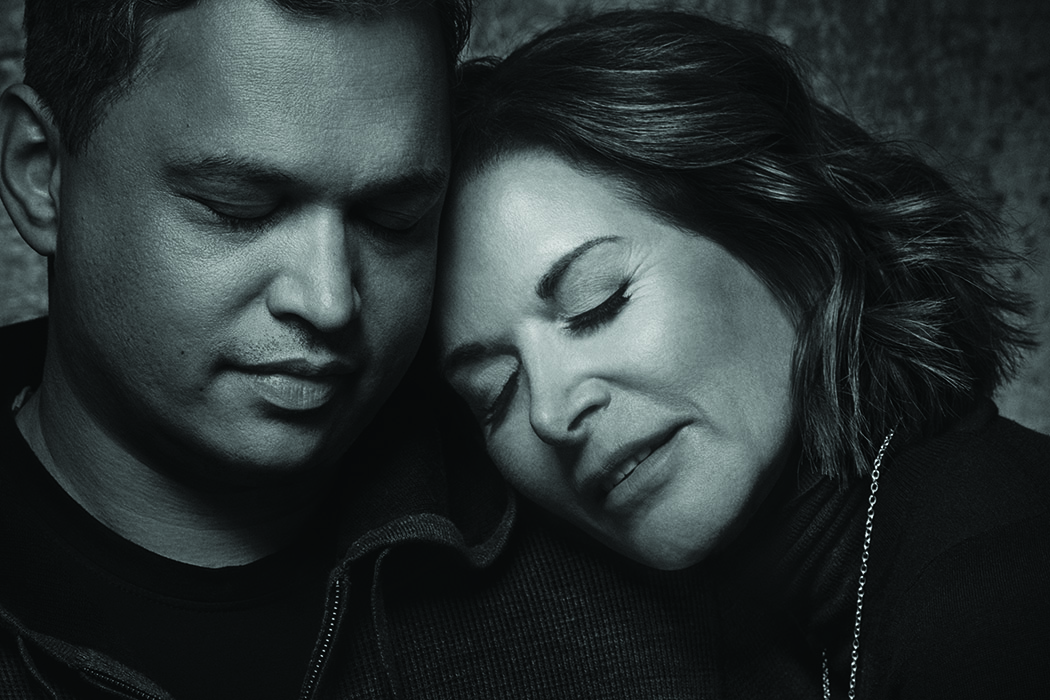
“Everything that has ever happened in your life is unfolding toward a greater purpose,” she remembers him saying. “Regardless of how challenging things are right now, something greater is on the precipice.”
At the end of his presentation, other women rushed him. Jan, unnerved, disappeared. “I ran into the kitchen because in Minnesota, when you’re in crisis you eat.”
Eventually, Jan’s friend thrust her into Panache’s presence. He turned and looked at her.
“All I could see and all I could feel were these two eyes, and everything else disappeared. It was as if I were being pierced through to my heart and soul,” Jan remembers. “He started telling me things about myself that nobody knew. I can’t talk about the specifics—I wouldn’t ever want that published. But he knew me. He knew what had happened to me, the experiences that I had.”
This, according to the Desais, is Panache’s gift. He says he was born with an ability to “experience others’ emotions and energy simply by being in proximity to them.” As a child, people would unburden themselves to him, to his bewilderment.
“I had a ‘knowing’ when I met (Jan). I just had this immediate recognition and knowing,” he says. In herself, she saw a “broken” woman. He saw a “supremely loving” woman who had “turned herself inside out her whole life for other people.”
“I need you to take a deep breath,” Jan remembers him saying. “I need you to see there is something you’re coming through, that despite all of these things, the best part of your life is about to start.”
Of course, neither knew that this “best” life would be the one they formed together.
Panache was born to Indian parents living in East London. His grandparents had immigrated there with 3 pounds and five kids, as his grandfather told it.
His fondest childhood moments were spent in the company of his spiritually attuned grandmother and in the quiet of her meditation room. In time, though, he’d layer over his introspective, devotional self an exterior tough enough to withstand the neighborhood bullies. In later years, he further suppressed his nature, choosing to study law and business over philosophy. In a family of Indian immigrants, “If you’re not an accountant, an attorney or a doctor, you’re a failure,” he says.
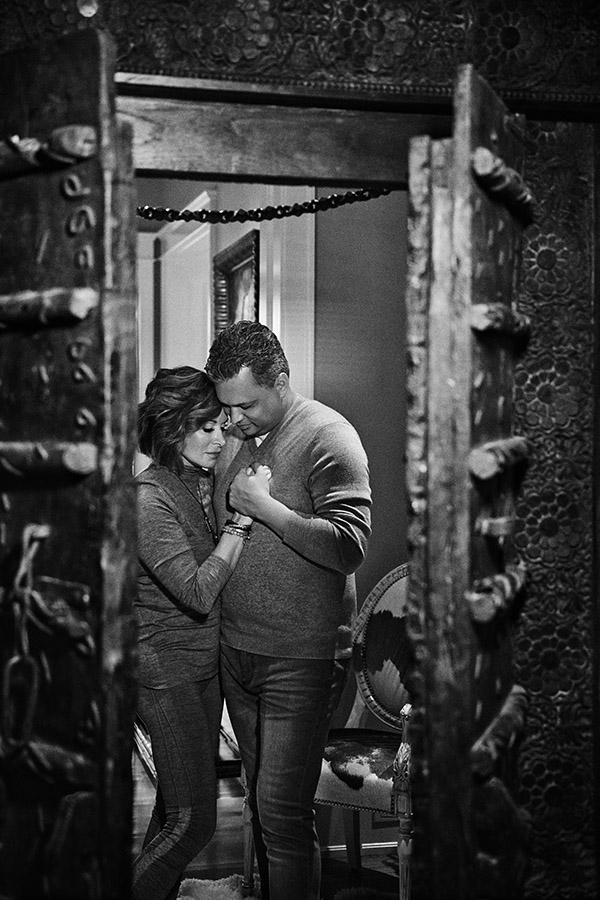
In his late teens, he worked as an emcee, becoming fairly prominent in London’s underground music scene. He enjoyed the attention, but he felt a growing loneliness and disconnect—not unlike the one Jan describes during the many years in which she constructed an outwardly enviable but internally vacant life.
By age 21, his invented self was entirely out of whack with his real one. “It becomes so painful to not be who you are that eventually at some point, something gives. For me, it got to a point where I had no desire to perpetuate this illusion of who Panache needed to be—to my grandfather, to my friends, to society, to anybody.”
Healing the disconnect between the invented and actual selves would become the foundation for Panache’s teaching, summarized in a simple, three-word saying: You Are Enough. “You will never be enough for anyone else in your life until you are enough for yourself,” he says.
He left England for America, entered an ashram in New York and began reconnecting with the spirituality of his early childhood. Then, on New Year’s Eve 2002, Panache had a vision. His entire room filled “from floor to ceiling in golden light,” he wrote in his first book, Discovering Your Soul Signature: A 33-Day Path to Purpose, Passion & Joy. He describes it as a profound and divine “love” that swallowed his fear and sadness. It marked his rebirth.
Here’s where we’ll pause to explore the polarity that is Panache Desai. He can be entirely unassuming—once he joked that he ought to be the face of Tommy Bahama for his laid-back demeanor. He’ll end his days not working in this formal library, but rather romping the house or the backyard with the kids (one peeked in the door to remind her parents that it was movie night and can’t they please come out now).
Conversely, he’s unabashed when it comes to characterizing his godly calling and perceived influence. “I was here to be a messenger, I now understood,” he wrote in describing the aftermath of his vision. His union with Jan, a businesswoman whose career has spanned finance, marketing and television, “laid the groundwork for global transformation.” The unlikelihood of their marriage, he explains, their commitment to breaching norms and embracing life’s potential, “has led to the creation of a business and a footprint that literally has transformed millions and millions of lives around the world.”
In fairness, the Desais have bragging rights aplenty—just four years into the formal start of their business, Panache, then in his mid-30s, sat down with Oprah on her Super Soul Sunday. His social media following tops half a million; subscribers to his group coaching programs number in the thousands; sales of his downloadable products are brisk. He’s appeared at conferences hosted by Arianna Huffington and Mika Brzezinski, collaborated with personal development A-listers like Neale Donald Walsch, and, just a few months ago, spoke at a retreat in Cambodia organized by Tony Robbins.
We’ll come back to Panache’s teachings. First, though, we’ve got to wrap up the business of why Jan and Panache tied the knot.
Following Panache’s speaking engagement in Naples, he and Jan kept talking. At the end of three months, he told her: “Listen, I have this amazing connection with you. It hasn’t gone away.” Nothing about the relationship made sense, he says, but he was “smitten.” “I had never in my life met an individual who was as dynamic and passionate about life as Jan.”
In short order, he decided to introduce her to his mother. “My mom has met every girlfriend I’ve ever had—and I’ve had amazing girlfriends—and my mom would say, ‘Please enjoy your time with him, but know you’re not his final destination,’” he says, grinning at the memory. “Single-handedly, she’s ruined my love life. So there’s always this hesitation about introducing people to Mom.”
But when they met, Mira Desai eyeballed Jan and, according to her son, said, “Welcome to the family. We’ve been waiting for you.”
Jan cuts in: Tell her about the cultural piece, about having your charts read. He explains his mother had his astrological chart—an Ayurvedic practice—done by two priests who had never met him. “My whole life is in there, and it’s 100 percent accurate,” he says. “In that chart, it said I would marry someone older than me from a different culture. It described her.”
For all the mysticism, there was reality to consider.
“Why in God’s name would you get married?” a chorus of friends shouted, predictably. But Jan rejected the idea of a casual, non-
binding affair. Deep down, she wanted more children; her husband, wanting them too, quieted her doubts about age and all of the other fears that arise when one’s aspirations defy societal expectations. But if there were to be children, Jan decreed, there must be marriage.
Pause again. You are thinking what everyone is thinking. You can ask; Jan is not shy. She explains they worked with an infertility specialist and a surrogate. (Age aside, Jan cannot bear children; her son had been adopted.) “It’s going to be the most painful thing you ever experience,” Jan warned Panache about their chosen path to parenthood. “We’re going to experience heartbreak. We’re going to experience highs and lows. It’s going to take everything out of us. It’s gonna be a huge expense. I just need you to be prepared for this.”

“That’s not my reality,” Jan remembers him responding. “He said, ‘That’s not what I believe in. I want you to see this through a new lens of possibility.’”
Panache picks up the story, as this lesson is a fundamental one in his teaching. “Life is as we have the capacity to observe it, so when we observe things as flawed or limited or incomplete, that’s the only way people can show up because we’re determining our experience.” See life through a lens of possibility and positivity, he urged his wife, and it will become limitless.
Positivity was easy enough during the straightforward pregnancy of their first children, twin girls who are now 6, but it was seriously tested after they conceived their second set. At five months, doctors detected in utero a potentially fatal heart defect in the baby girl; the boy was healthy.
“I spun and I spiraled,” Jan remembers. “I said to Panache, ‘How am I gonna do this? How am I gonna parent a special-needs child?’ We had two healthy kids and another baby coming that’s healthy. … The what-ifs were monumental. I looked at him and said, ‘How am I going to climb this mountain?’
“He said, ‘Jan, you’re not being asked to climb this mountain. Celeste is going to come into this life and climb the mountain. All you are being asked is if you will be her Sherpa. Do you have what it takes to lovingly be this child’s Sherpa?’”
“Of course,” she choked. Celeste, now 4, survived the pregnancy. She survived an eight-minute flatline. She survived a heart transplant. She’s not without the challenges that accompany transplantation, but, remarkably, she came through without cognitive impairments. On a Sunday afternoon, she’s the last of the Desai kids to leave the family pool, wiggling away from her grandmother, who’s trying to wrap a towel around her and coax a comb through her hair.
“She’s the boss baby of the house,” Panache says. “She is on track in every way, and that’s just unbelievable. So sometimes our worst-case scenarios can become the greatest blessing we experience in life if we allow it to be that.”
Family life allows the Desais to practice what Panache preaches—beginning with how they parent.
“We’ve been conditioned from the moment we are born to conform,” Panache says. Parents, even with the best of intentions, impose limits or expectations. Schools strip individuality. Peer groups set expectations, norms and bars to reach. “No matter how hard you try, you’re never gonna get there, and at some point you need to realize, it’s all a giant illusion.”
His wife agrees. “It can be as innocuous as, ‘Oh, you’re such a sweet little girl, you’re going to grow up to be just perfect.’ And if that’s how you are parented and communicated with and how love is shown, you grow up wanting to fit that perfect persona.”
Adds Panache, “At that point you are playing a role. You are living in a façade instead of just showing the world who you are.”
With these kids, they choose words carefully, encourage emotional expression, promote curiosity even when little Celeste wanders into the family’s meditation room and tinkers with figurines and chiming bowls and objects that in another household might be strictly off-limits.
“My poor children!” Jan says of her older son and stepdaughter. “I grew up a Type A perfectionist. Everything had to be perfect. My children were a reflection of me. Their behavior, the way they dressed, the way they spoke—all of it.” She has since sought to make amends to her older children and to express how she loves them—for who they are. “I am closer now to my older kids than I have ever been.”
Love. That’s at the heart of all of this, Panache says. Love of family. Love of community. And, most critically, love of self and everything that makes the self a one-of-a-kind entity. “Just like everything in nature has a perfection to its design, so do we,” he says.
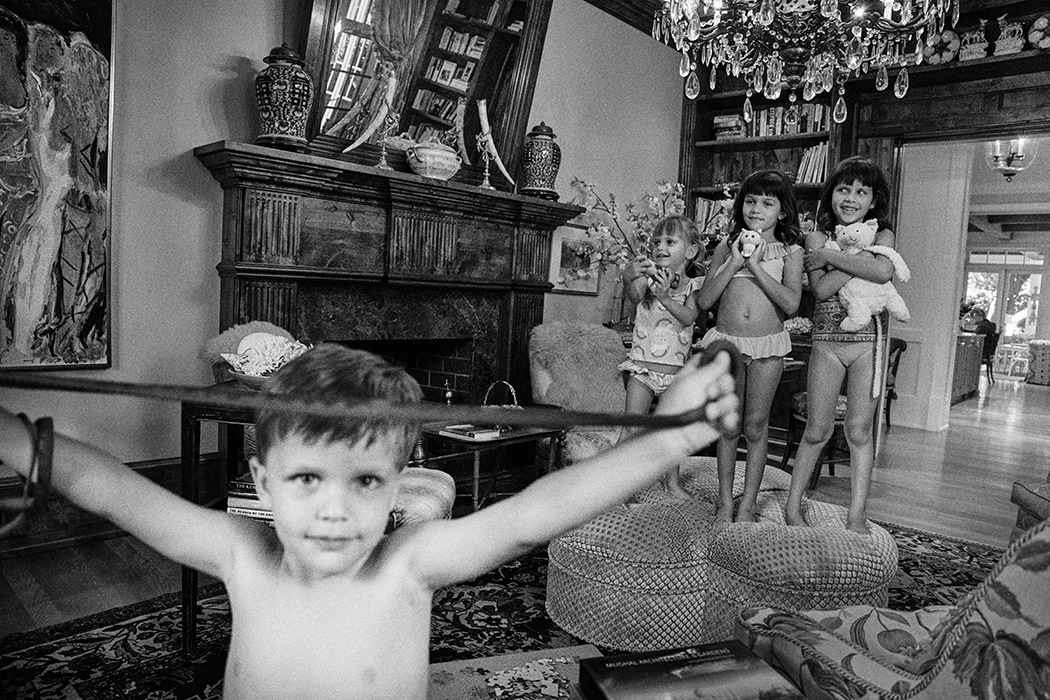
In developing a platform—a business around sharing his ideas—Panache finds himself in a crowded space. Countless speakers, writers, spiritualists, life coaches and self-help gurus guide audiences on similar journeys toward inner peace. The messages overlap even if the approaches vary. The Power of Now. Daring Greatly. Awaken the Giant Within. Eat, Pray, Love. The Power of Positive Thinking, which also starts with a three-word mantra, “Believe in Yourself!”
Panache describes himself as a fusion of spiritual leader Deepak Chopra and personal development guru Tony Robbins, two men he’s close to and draws inspiration from.
“At the intersection of both these ways of being is an emerging paradigm of transformation,” he says. “It’s not one or the other, it’s both of them together, walking forward in lockstep.” His own “unique impact” is a problem-solving ability drawn from his empathy and ability to connect with people, he says. “I can take anything that’s going on literally on any level and resolve it for anybody.”
Then he mentions a term that defines his work: vibrational transformation.
Pause one last time. This is where we realize we might lose some of you—those who don’t gravitate toward terms like “energy shifts” or “vibrational catalyst” or “density detox” or “enlightenment.” Hang tight—if you don’t buy into his terminology, his fundamental ideas may resonate nonetheless.
Panache believes we—and everything around us—are made up of energy, ever vibrating even if we don’t notice. Most of us are walking around like an out-of-tune violin—squeaky and dissonant. Panache encourages his audience to tune their proverbial strings. By shifting your energy, he believes, you can find your perfect pitch—your “soul signature,” the unique expression of self.
The journey of self-discovery starts with navigating one’s emotions. “When we repress our emotions or suppress our emotional content, whatever we are denying accumulates weight, or what I have come to call vibrational density,” he wrote in Discovering Your Soul Signature. “This heaviness can take many forms. But in all cases, it impedes your spirit’s natural ability to shine.”
He challenges his audience to examine emotions, behaviors and thought-patterns, to explore every part of the self—especially the stuff buried deep. That’s where the healing starts. “There was a torrent of emotion that broke lose that I didn’t even know existed in me,” Jan says of their first encounter on that long-ago Monday night.
“The more encumbered we are,” Panache explains in the book, “the lower our rate of vibration—of connectedness, aliveness, joy. The lighter we are—the more we’ve dealt with everything inside of us—the more we are able to bring into our lives abundance, health, love and soulfulness.”
These days, he is light. Jan is light.
Panache used to deliver his message almost exclusively on the road. He still travels. Last May, in addition to appearing with Tony Robbins in Cambodia, Panache headed a program in Costa Rica, then taught at the Omega Institute in New York in June and, in August, will host a “global gathering” for 500 in Phoenix.
But with four young children, Jan, who runs the company’s operations, has helped her husband shift to online courses, downloadable products and remote group mentoring programs. Panache gives away content on social media via routine live streamed talks. For profit, he, with Jan’s guidance, has developed a suite of offerings focusing on topics such as self-discovery, stress management, meditation, breath awareness, Buddhism, the Bhagavad Gita, the Beatitudes. He offers longer-term group coaching and a limited number of one-on-one mentorships for executives, celebrities, political leaders and the like. “I’m basically a partner in their lives,” he says of the latter group. Sometimes he’ll partner in their companies, too. His business is altruistic—but let’s not pretend it’s not a business.
“Hello, sweet friends!” Panache sits in front of a webcam in his library, smiling, waiting for members to log in to an hourlong video conference in April. He’s speaking today about “acceptance”—accepting people for who they are but also accepting the fact that we need to shed negative relationships on the road to enlightenment. “This is a tough, direct, yet probably the most pivotal conversation we’re ever gonna have.”
His hands punctuate main ideas, staccato movements emphasizing key points. “I want you to dream a bigger dream … to have the courage to ask for what you want.”
In person, he’s even more animated. A couple of months ago, at Unity Church in Naples, he marches back and forth across the altar, down the stairs, through the aisle, back up the stairs, the intensity of a evangelist leading people in what sounds like a prayer. “I see you. I see God in you. I see the love that you are.” “Your heart,” he concludes, “is the doorway through which God gets to love its creation.”
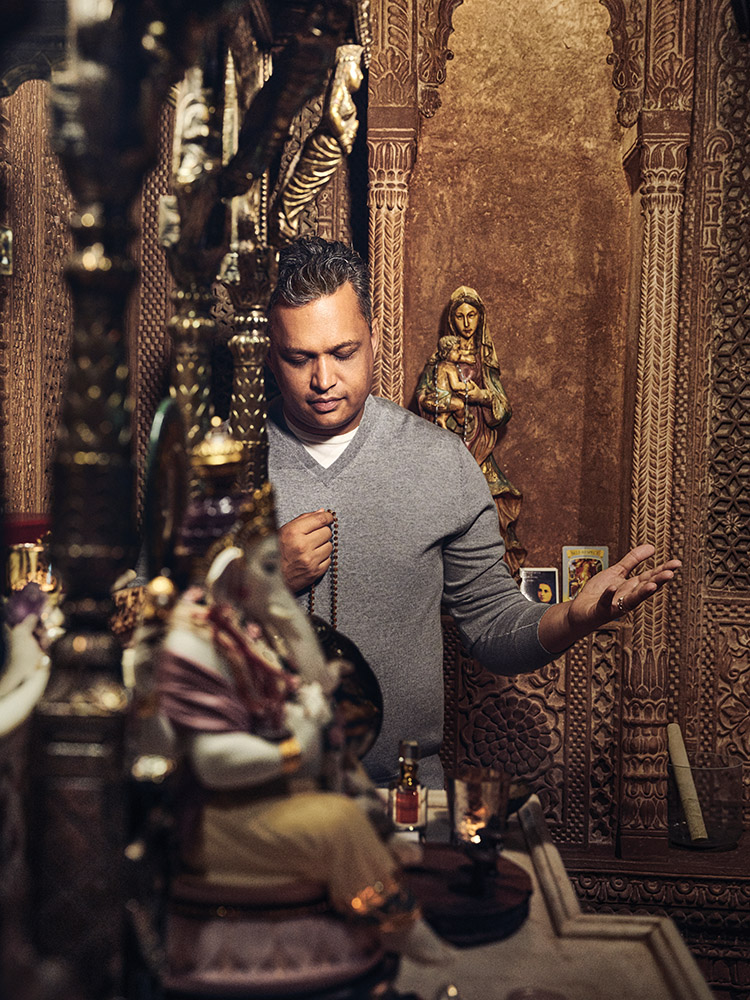
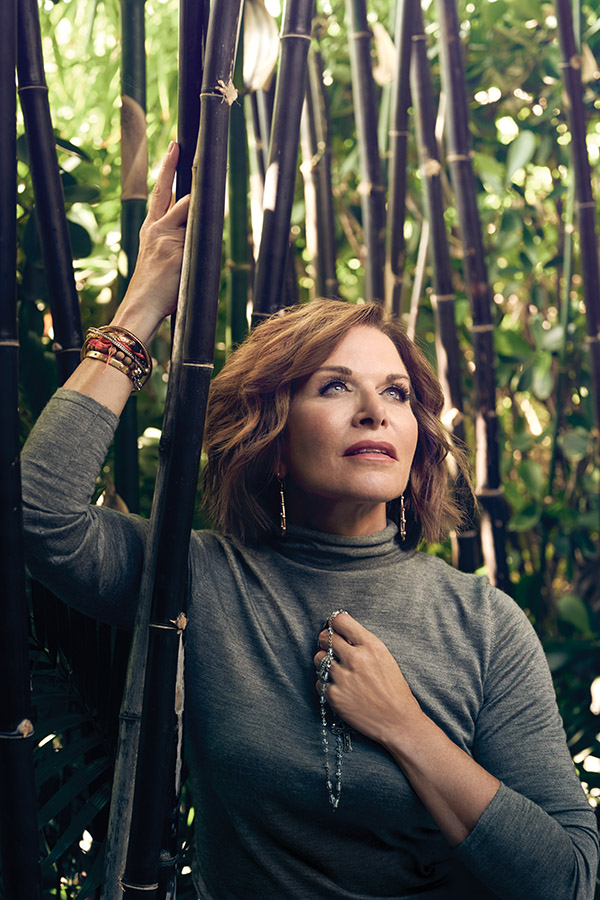
Jan, who looks 10 or more years younger than her biological age, gets questions all the time about her beauty regime, about what “work” she’s had, about why she doesn’t appear to be aging. She shrugs it off.
“This is what happiness looks like. This is what peace looks like. When you’re not constantly in battle with what’s unfolding, then there is something transformational. And it is available to everyone,” she says.
Her husband’s message, outwardly, is about the cultivation of the self—finding happiness, finding success, finding inner beauty. If his message stopped there, it might be off-putting for its self-centeredness.
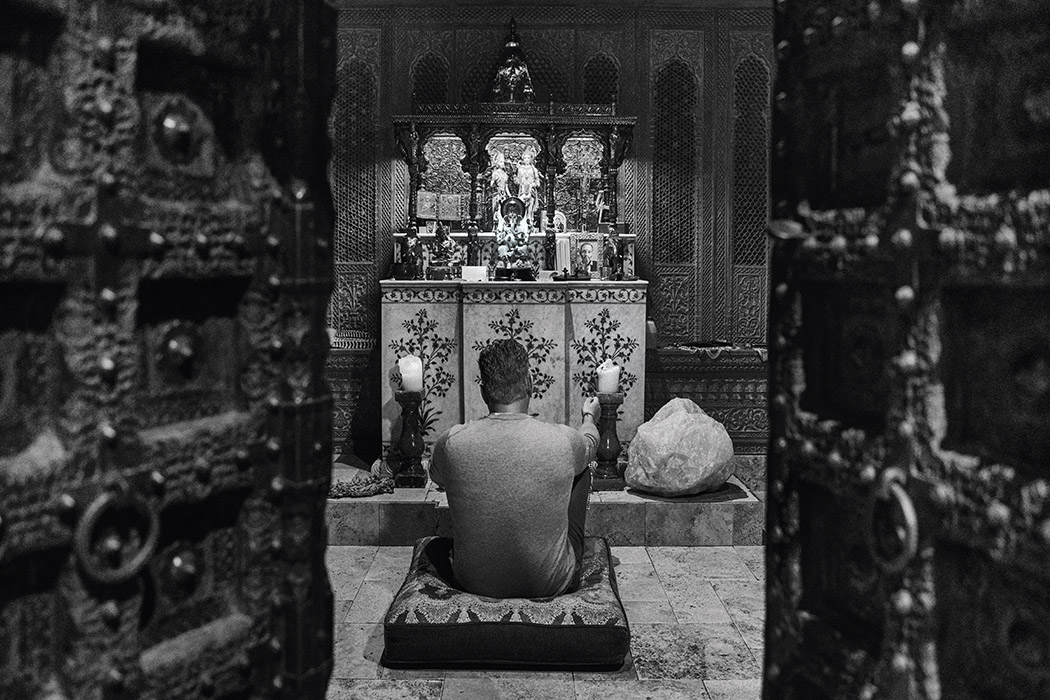
But that’s not the end game, the Desais say. Once you let your real self shine, you can channel your energy into serving others.
“You start to live from a place of overflow,” Panache explains. “Once you have dealt with what is unresolved in you and your subconscious and you’ve taken care of everything you have to on a basic level, that’s when your service begins. It (becomes) about, ‘How can I help you?’ ‘How can I make a difference?’ ‘How can I empower people?’ ‘How can I offer people opportunity?’ … At that point, you’re not giving to get. You’re giving for the sake of giving. It’s showing up every day and asking, ‘How may I serve?’”
Jan smiles. Twelve years into her marriage, she still marvels at the difference between the person she is today and her former self, so tightly wound she was “scary,” so intense she couldn’t exhale.
“I’m breaking all the rules. Who has kids at 55? That’s a rule-buster. Who stops wearing makeup at 50? Who buys clothes at Target? I’m married to this fabulous man who is not what you would expect in this community, but we’re creating this fabulous life. And in breaking the rules and really creating our own path, we’re giving life to possibilities for so many people.”

